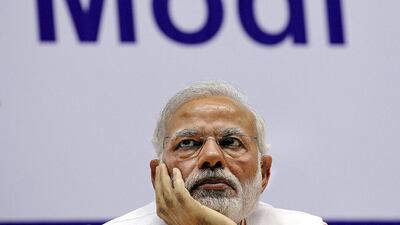NEW DELHI // Every August 15, India’s Independence Day, the prime minister outlines his vision and ideas for the nation in an address to citizens.
However, on Saturday, Narendra Modi will end this tradition, incorporating into his speech ideas crowdsourced from across the country, and offering a voice to ordinary Indian citizens.
On July 26, during his monthly radio address, the prime minister invited suggestions for subjects he should address in the speech. Since then, nearly 10,000 submissions have poured in to MyGov.in, a government-run portal for Mr Modi’s digital outreach programme that includes other tools such as his Twitter account and a smartphone app.
"The prime minister has done this on occasion before: crowdsourced suggestions and ideas," Gaurav Dwivedi, chief executive officer of MyGov.in, told The National on Monday. "But this is by far the largest response we've seen."
The first Independence Day address was delivered by Jawaharlal Nehru, who became prime minister when India became independent in 1947.
Nehru’s speech, titled “Tryst with Destiny”, is perhaps the most famous speech ever delivered in India. His identification of problems to be tackled and his high optimism — along with the focus on his own vision — set the tone for subsequent Independence Day addresses.
The future, Nehru said, “is not one of ease or resting but of incessant striving ... The service of India means the service of the millions who suffer. It means the ending of poverty and ignorance and disease and inequality of opportunity.”
Mr Modi’s speech last year, spanning an hour and delivered extempore from the ramparts of Red Fort in Delhi, where most Independence Day speeches have been delivered, touched on several subjects: the crisis of sexual violence and rape, terrorism, India’s industrial challenges, tourism and foreign policy.
But Mr Modi also echoed some of the larger themes found in Mr Nehru’s first address.
“My dear countrymen, believe in my words, I do assure you,” he said. “Shun all the sins committed so far, give up that way, follow the way of goodwill and brotherhood, and let’s resolve to take the country forward. I believe we can do that.”
Over the past 10 months, Mr Modi has solicited public input through MyGov.in on several other occasions. Most prominently, Mr Dwivedi said, for his speech at a reception during a visit to Australia last November.
“The Independence Day exercise is a logical progression of the same thought process,” he said.
Suggestions for Saturday’s speech on MyGov.in scroll on seemingly endlessly. Written in a mix of English and Hindi, they pour in at a rate of 500-600 per day. New Delhi dominates the mix, with nearly 27 per cent of all ideas coming from the country’s capital.
The roster of concerns includes linking India’s rivers and tributaries to facilitate transport and water sharing; the suicides of debt-ridden farmers; changing India’s name to its ancient Sanskrit designation “Bharat”; instituting scholarships for young scientists; and establishing new tourism circuits.
“Unemployment is the main issue,” said one user named Ramesh Tokachichu. “Still the case is, poor are still poor, and middle class in middle class, but rich are becoming richest… We need to improve education quality from root level to increase boldness in young people so that they can choose their best path.”
The rare instance of criticism has also made its way online.
“Mr Modi, At least be honest on the independence day and confess before the nation that you actually represent the capitalist class of this country,” a user named Anand_62 wrote. “Will you admit that you have betrayed the common man of this country?”
Mr Dwivedi said his staff sent summaries of suggestions received to Mr Modi’s office, but the prime minister would decide which ideas to include.
“We’ll send our final batch on August 13, a couple of days before the speech, to enable as many people as possible to send in their comments.”
The idea has left some citizens unimpressed, however.
“We look to the Independence Day speech to find out what the prime minister thinks, not what the rest of us think,” said Vijaya Ramachandran, 65, a housewife in New Delhi.
“The TV channels and newspapers are already full of regular Indians talking about what they see as the problems with our country,” she said. “The prime minister should be telling us about the solutions to these problems.”
But MC Ravindran, who posted a complaint about air pollution in his hometown of Kochi, in Kerala, said that he felt glad to be able to register his opinion so easily.
“Now I hope it doesn’t get lost in all the other posts, and that the prime minister sees it,” he said.
ssubramanian@thenational.ae

